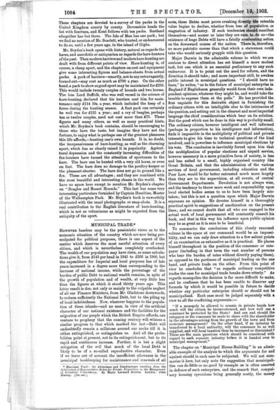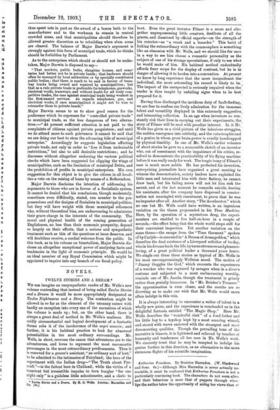MUNICIPAL TRADE.*
HOWEVER baseless may be the pessimistic views as to the economic situation of the country which are now being pro- mulgated for political purposes, there is one aspect of the matter which deserves the most careful attention of every citizen, and which is nevertheless completely overlooked. The wealth of our population may have risen, as some calcula- tions give it, from ┬Ż143 per head in 1845 to ┬Ż366 in 1900, but the expenditure for Imperial and local purposes has of late years increased in a degree more than corresponding to the increase of national income, while the percentage of the burden of public Debt to national wealth remains, in spite of the growth of population and of wealth, at very little less than the figures at which it stood thirty years ago. This latter result is due, not only or mainly to the culpable neglect of all our Finance Ministers, from Mr. Gladstone downwards, to redeem sufficiently the National Debt, but to the piling up of local indebtedness. Now, whatever happens to the popula- tion of these islandsŌĆöand no man, in view of the artificial character of our national existence and the facilities for the migration of our people which the British Empire affords, can venture to prophesy that the coming century will witness a similar progress to that which marked the lastŌĆöDebt will undoubtedly remain a millstone around our necks till it is either extinguished, or extinguishes us. And all the proba- bilities point at.present, not to its extinguishment, but to its rapid and continuous increase. Further, it is but a slight mitigation of the evil that much of the local Debt is likely to be of a so-called reproductive character. Even if we leave out of account the insufficient allowance in the municipal bookkeeping for maintenance and renewals of all ŌĆó Municipal Trade the Advantages and Disadvantages resulting from the Substa cation of Representative Bodies for Private Proprietors in the Management (1 Industrial Undertakings. By Major Leonard D.u-win. London John Murray. [Us. net.] sorts, these Debts must prove crushing direct, Nis rateable value begins to decline, whether from loss of vopplation or stagnation of industry. If such tendencies should manifest themselvesŌĆöand sooner or later they are aura t.9.4o soŌĆöthe existence of huge Debts will have a fatally aooelerating action on the downward course of the nation. There is, therefore, no more patriotic course than that which a statesman could take who would seriously grapple with this question.
Major Darwin in the admirable volume to which we are anxious to direct attention has set himself a more modest task, but one which is an essential preliminary to any such endeavour. It is to point out the need for reform, and the direction it should take ; and more important still, to awaken public interest in municipal questions. " I should have no fears," he writes, " as to the future of municipal enterprise in England if Englishmen generally would form their own inde- pendent opinions, whatever they might be, and would take the trouble to express them at the polls." He has provided the first requisite for this desirable object in furnishing the ordinary citizen with an intelligible clue to the intricacies of the question, and setting out in the clearest and most impartial language the chief considerations which bear on its solution. But the good which can be done in this way is probably small. The ordinary citizen, however intelligent and well informed (perhaps in proportion to his intelligence and information), finds it impossible in the multiplicity of political and private interests to give his time to technical questions of the kind involved, and is powerless to influence municipal elections by his vote. The conclusion is inevitably forced upon him that the multiplication of popular elections and unpaid service, however necessary in a more primitive form of society, is less and less suited to a small, highly organised country like Great Britain, and that the administration of the various services of local government, including education and the Poor Law, would be far better entrusted much more largely than they are to the supervision, at all events, of central Government Departments. Devolution is not always wise, and the tendency to throw more work and responsibility upon local elected bodies seems to us to have been largely mis- taken ; but this is not a. question upon which Major Darwin expresses an opinion. He devotes himself in a thoroughly practical spirit to suggestions of amelioration on the present lines ; and we cannot doubt that all who are engaged in the actual work of local government will constantly consult his book, and that in this way his influence upon public opinion may be as great as it is sure to be beneficial.
To summarise the conclusions of this closely reasoned volume in the space at our command would be an impossi- bility, and we can only draw attention to a few salient points of an examination as exhaustive as it is practical. He places himself throughout in the position of the consumer or rate- payer (including in that term the vast number of persons
who bear the burden of rates without directly paying them), as opposed to the partisans of municipal trading on the one hand, and private trade on the other. From this point of view he concludes that " as regards ordinary competitive trades the case for municipal trade breaks down utterly." As regards monopolies the decision is far more difficult to make, and he confesses that he has been unable to discover any formula by which it would be possible in future to decide whether any particular enterprise should or should not be municipalised. Each case must be judged separately with a view to all the conflicting arguments:ŌĆö "If a monopoly be allowed to remain in private hands how much will the citizen be inconvenienced, and how well can a consumer be protected by the State ? And can and should the ratepayer or the consumer be made to share with the shareholder in the advantages arising from the growth of the town and from economic management? On the other hand, if an industry be transferred to a local authority, will the consumer be as well supplied, and will local taxation thus be increased or diminished ? These are the main questions which should be considered with regard to each separate industry before it is handed over to municipal management."
The chapter on "Municipal House-Building" is an admir- able example of the analysis to which the arguments for and against should in each case be subjected. We will not sum- marise it here, but only note the suggestion that municipali- ties can do little or no good by example as is often asserted in defence of such enterprises, and the remark that, compul- sory housing operations being generally costly, the money
thus spent iota in part as the award of a bonus both to the manufacturer and to the workman to remain in central
crowded areas, and that municipalities should therefore be allowed greater discretion as to rebuilding when slum areas are cleared. The balance of Major Darwin's argument is strongly against this form of municipal trade, which he thinks should be forbidden by Parliament As to the enterprises which should or should not be under- taken, Major Darwin is disposed to say-
" That markets, public baths, slaughter houses, and ceme- teries had better not be in private hands ; that harbours should often be managed by local authorities or by specially constituted public bodies ; that there is much to be said in favour of tram- way tracks being owned and repaired by municipalities ; but that as a rule private trade is preferable for telephones, gasworks, electrical works, tramways, and without doubt for all truly com- petitive trades, the case against municipal trade being weakest in the first-named services. As regards telephones, gas, and electrical works, if once municipalised it might not be wise to retransfer them to private hands."
Major Darwin seems to us to show good reason for the preference which he expresses for "controlled private trade" to municipal trade, as the less dangerous of two alterna- tives :ŌĆö" At present sufficient attention is not paid to the complaints of citizens against private proprietors ; and until we do attend more to such grievances it cannot be said that we are doing our best to stem the advancing tide of municipal enterprise." Accordingly he suggests legislation affecting private trade, not only in order to "free it from undesirable restrictions," but also to add desirable restrictions ; and he discusses without altogether endorsing the various political checks which have been suggested for clipping the wings of municipalities, such as the limitation of municipal Debts, and the prohibition of profits in municipal enterprises. His own suggestion for this object is to give the citizen in all locali- ties a veto on the raising of loans by means of a Referendum.
Major Darwin disclaims the intention of addressing his arguments to those who are in favour of a Socialistic system.
It cannot be denied that his conclusions, though moderately, sometimes even diffidently, stated, run counter to the pre- possessions and the designs of Socialists in municipal politics; but they will have weight with those municipal reformers who, without theoretical bias, are endeavouring to administer their grave charge in the interests of the community. The moral and physical health of the coming generation of Englishmen, no less than their economic prosperity, depend so largely on their efforts, that a serious and sympathetic treatment such as this of the questions at issue deserves, and will doubtless receive, a cordial welcome from the public. In this book, as in his volume on bimetallism, Major Darwin dis- closes an altogether exceptional power of analysing facts and tendencies in the light of economic principle. He would be an ideal member of any Royal Commission which might be appointed to inquire into any branch of our fiscal policy.



















































 Previous page
Previous page